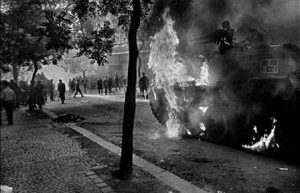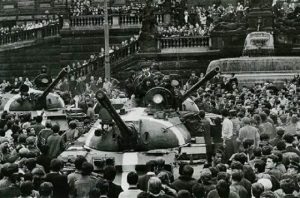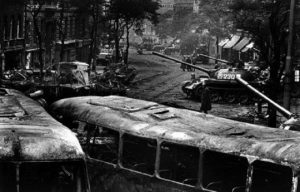Por Carlos Mareco
El 68 fue un año que inspiro rebeliones en distintas partes del planeta, desde Francia a EEUU y Vietnam, ese entusiasmo que luego llegó a América Latina con el Cordobazo en Argentina y Tlatelolco en México.
Tras la muerte de Stalin se dan los llamados procesos de “desestalinización” en la URRS y los Estados burocráticos de Europa del Este, estallan así grandes movilizaciones populares en busca de mejores condiciones de vida y libertades democráticas y políticas. Está la sublevación de Alemania del Este en 1953, las protestas de Poznan y el Octubre Polaco en 1956 y la revolución Húngara en 1956, todos procesos que fueron derrotados en su momento.
La crisis checoslovaca y el ascenso de Dubček
En 1967 se agudiza la crisis económica checoslovaca, que si bien era un país industrializado, sufría el problema de que la producción estaba orientada a la exportación y no a satisfacer las necesidades locales. En este contexto se expresaban dos bandos principales al interior del Partido Comunista de Checoslovaquia (KSČ). Un sector conservador que pretendía mantener el mismo régimen autoritario y no aceptaba ningún cuestionamiento al régimen, comandado por Antonín Novotný, Primer Secretario del KSČ. Novotný apoyaría lentamente la reformas impulsadas por Kruschev, hasta que éste fue reemplazado en el 64 por el conservador Leónidas Brezchnev que desde la URSS buscaba frenar las reformas.
El otra ala, veía el descontento de las masas con el régimen y quería ponerse al frente de los reclamos que ya empezaban a manifestarse desde antes del 68. Los reformistas buscaban descomprimir la situación social, pero mantener la planificación de la economía controlada desde el estado con mayores libertades democráticas, políticas y de prensa, este sector se referenciaba en Alexander Dubček que en enero de 1968 reemplazaría a Novotný en la dirección del KSČ. El cambio se dio con el visto bueno de Brezchnev que pensaba controlar las reformas y al propio Dubček.
Un tercer sector, restauracionista que buscaba la implementación de la economía mixta era minoritaria y no calaba en el movimiento de masas.
Comienza la Primavera de Praga
En principio el descontento venía de los sectores intelectuales, entre estos destaca el escritor Milan Kundera. Con el cambio de mando en el KSČ, el 5 de marzo del 68 se levanta la censura. Los intelectuales se animan y publican lo primera revista sin censuras con más de 300.000 ejemplares distribuidos, además empiezan las declaraciones a los medios de comunicación contra el anterior régimen de Novotný.
En abril el Comité Central del PC aprobaba el “Plan de Acción”, un programa que junto a una pequeña liberalización económica, planteaba un profundo cambio político que incluía la libre creación de partidos políticos (siempre que aceptaran el modelo económico existente), igualdad nacional entre checos y eslovacos, libertad de los presos políticos. En lo social incluía el derecho a huelga, los sindicatos independientes y la libertad religiosa. En política exterior mantenía su lazo con la URSS y adhesión al Pacto de Varsovia, con la novedad de que reconocía al Estado de Israel.
Entraba en acción el movimiento obrero con asambleas por empresa, cambios en las direcciones sindicales, también se revocaron los mandos de algunas empresas. El ente regulador de los sindicatos informaba que en 250 empresas se eligieron nuevos dirigentes mediante asambleas. Se viven tiempos de mucha euforia, se cuestionaba todo y se crearon todo tipo de organizaciones al mismo tiempo que los propios organismos del PC sufrían cambios. Las reformas impulsadas por Dubček estaban muy por detrás de los cambios que ya imponía el movimiento obrero, estudiantil y popular. De hecho en julio del 68 aparecía el “Manifiesto de las 2000 palabras” que alentaba al pueblo a implementar las reformas por si mismo, ya que el régimen no avanzaba. Las movilizaciones levantaban las consignas que Trotsky ya había planteado para los procesos de revolución política.
La invasión del Pacto de Varsovia: el invierno está aquí
Desde febrero, Brezchnev en sus visitas a Checoslovaquia, advertía a Dubček que debía moderarse y frenar las reformas, lo incitaban a un cambio de discurso. En marzo se reúne en Alemania el Pacto de Varsovia para advertir a Checoslovaquia. En mayo se diseña un plan de invasión y en junio se implementan maniobras y entrenamientos militares en territorio checo, así comienza la ocupación con tropas soviéticas. Entre Julio y Agosto aumentan las tensiones, el Pacto de Varsovia dirige una carta al KSČ y Dubček la rechaza, tampoco acepta viajar hasta Moscú. El pueblo checoslovaco cierra filas y se prepara para una invasión. En Agosto se preparaba un nuevo congreso del PC, el Kremlin pide que no se realice y que renuncie tanto Dubček el Primer Secretario del PC y Svoboda gobernante checoslovaco que avalaba las reformas. Estos no aceptan y Dubček es detenido. El XIV Congreso se hace igual, se elige un nuevo CC formado principalmente por Dubček y el resto de los presos, se crean nuevos estatutos, se pronuncia en contra de la invasión militar y por el cumplimiento del “Programa de Acción”.
Entre el 20 y 21 de agosto se iniciaba la invasión con 200.000 tropas y 2000 tanques, el gobierno checoslovaco no entregó armas al pueblo y el ejército no salió a frenar la invasión y Dubček pidió al pueblo que no resistiera. Aun así, la clase obrera, los estudiantes, intelectuales y sectores populares opusieron resistencia callejera a la invasión, se valieron de las barricadas, comités de fábricas y de la creatividad para frenar los tanques del Pacto de Varsovia. Cambiaron las señales de tránsito, modificaron los nombres de las calles, a todas ponían “Dubček” o “Svoboda”, sólo dejaron las que conducían a Moscú.
El resultado fue 72 muertos, 266 heridos graves y 436 heridos leves. Migraron del país en principio 70.000 checoslovacos y hacia el final unas 300.000 personas. Cuando pudieron controlar el país pusieron en el gobierno al conservador Husak, depuraron el PC, se deshicieron de un tercio de los afiliados y así a pesar del desgaste y la desaprobación hacia un régimen autoritario se mantuvieron las cosas por la vía de las armas y traición de su propia dirección política.
Los Partidos Comunistas del mundo apoyaron la invasión, incluido Fidel Castro y el PC de Francia que venía de traicionar el Mayo Francés confiando en Charles de Gualle. La China de Mao denunció el acto por considerarlo socialimperialista y la comparó con el fascismo, temía que una invasión militar parecida caiga sobre territorio chino. Esos días también hubo movilizaciones en la Plaza Roja de Moscú y Finlandia en contra de la intervención militar en Checoslovaquia.







